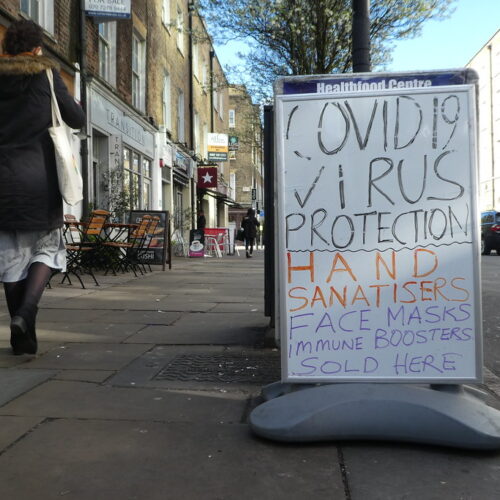“I am a 61 year old male with no family. I have a severe lung disease with a low immune system. I tend to stay in my darkened bedroom, which I know is not healthy, but it makes me feel safe. I am yearning for a hug,” read a comment submitted by an anonymous viewer during the mental health panel sponsored by The Renaudin Foundation on September 14, 2020. Hosted by The Times-Picayune and The New Orleans Advocate, the virtual event brought together psychology and trauma experts from Tulane University and LSU to speak about the impact of COVID-19 on mental health in a free and accessible way.
According to a recent study published by the Centers of Disease Control and Prevention, more than 40% of adults in the United States are experiencing higher rates of negative mental health conditions due to the pandemic. It also stated that the majority of survey respondents were more concerned about their mental wellbeing rather than their physical wellbeing due to the high rate of asymptomatic cases.
“This is a collective trauma like we have never experienced. Everyone is going through something whether it be emotional, physical or financial,” said Dr. Charles Figley, the director of the Tulane Trauma Institute. “It is not a pretty time.”
With the majority of the world focused on testing and vaccine clinical trials, mental health support has slipped out of the public eye. Eventually, the pandemic will become a story of the past; however, there must be infrastructure in place to deal with the lingering adverse mental conditions.
Dr. Moore, a clinical psychiatry professor at LSU Health New Orleans, recommends for people to practice self care, rather than just developing short term coping mechanisms. Coping strategies target anxiety brought on in the moment, for example, the deployment of breathing exercises in a stressful situation. Self care focuses on long term solutions for extended periods of distress, like a pandemic.

Street sign advertising COVID-19 supplies (Photo by: duncan c)
With over 36 million cases worldwide as of mid October, the current mental health response is not effective nor widespread enough, as evidenced by the recent findings of the CDC. Regardless of the type of trauma experienced by a person due to the COVID-19 pandemic, these self care strategies can be used to improve mental wellbeing.
One of the cornerstones of a self care routine should be consistency. That comes in the form of exercise, sleep and diet. Specifically for diet, fresh and healthy foods should be prioritized to increase alertness and clear thinking. Each day, these elements should remain as unchanged as possible in order to introduce stability to a very chaotic period of time. Setting aside a scheduled period of time for yourself is incredibly beneficial to one’s mental health because it allows for thoughtful reflection and time away from the stressors of a pandemic. Creating a self care routine can be as easy as walking around your block before lunch or reading a book outside. These simple lifestyle changes have been shown to have a great impact on mental wellbeing.

Other helpful self care strategies (Graphic by: Sacha Chua)
Fortunately, New Orleans is an excellent place for practicing self care with its historic streets and beautiful parks. “Walking down St. Charles allows me to forget about all that is going wrong in the world, and focus on the beauty around me,” says Ilana Lurie, a junior at Tulane University. Beginning in March, she has improved her mental health by carving out a period of her day for herself, whether it be 10 minutes or 2 hours. Two of her favorite activities are walking around the neighborhood or people-watching from her front porch. “The things I do seem small in the grand scheme of things, but they help me feel better,” she says. “I think people would benefit from taking a step back from all the negativity and doing something each day that makes them feel at peace.”
In addition to self care strategies, Dr. Figley and Dr. Moore both agree that acknowledging the difficulty of the pandemic is also incredibly beneficial for one’s mental health. “Validating to yourself that this is indeed a stressful and overwhelming event for everyone is very impactful,” Dr. Moore said. “Acknowledge that even hard days are good enough and that there is no expectation that every day is going to be perfect.”
We live in a highly results-driven society where a lack of productivity categorizes the day as a waste. This pressure discourages people from taking breaks throughout the day which results in a lack of self care. Like Dr. Moore said, it is more than acceptable to have a day where nothing gets done. That is the essence of self care: you do what you must to keep moving forward. Six months into the pandemic with no clear end in sight, we must incorporate self care into our daily lives, or we may all find ourselves retreating back into our darkened bedrooms.
 NOLAbeings
Multimedia artist Claire Bangser created NOLAbeings as a portrait-based story project that marries...
NOLAbeings
Multimedia artist Claire Bangser created NOLAbeings as a portrait-based story project that marries...
 Data corner: Adobe Suite (create a PDF, social media graphic, presentation, edit a photo and video
Data corner is where you go to work with analytics and top tech skills. It takes on everything from PERL and SQL to Canva and Sprout Social.
Data corner: Adobe Suite (create a PDF, social media graphic, presentation, edit a photo and video
Data corner is where you go to work with analytics and top tech skills. It takes on everything from PERL and SQL to Canva and Sprout Social.
